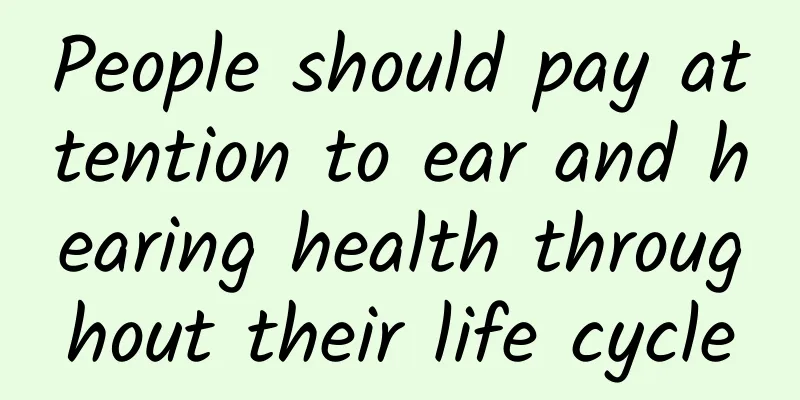People should pay attention to ear and hearing health throughout their life cycle

|
On the eve of World Hearing Day this year, the World Health Organization released its first World Hearing Report, which states that one in five people in the world currently suffers from hearing loss, affecting more than 1.5 billion people worldwide, and it is estimated that by 2050, nearly 2.5 billion people in the world will suffer from some degree of hearing loss. So what is hearing loss? How harmful is hearing loss? What hearing losses can be prevented in advance? Fu Xinxing, leader of the Clinical Audiology Center of Beijing Tongren Hospital affiliated to Capital Medical University and the World Health Organization Collaborating Center for Prevention of Deafness, gave us a detailed explanation. "The normal average hearing of our two ears is within 20 decibels. Hearing loss is a different degree of loss relative to normal hearing. If the hearing reaches 35 decibels, it is called moderate or above hearing loss (also known as disabling hearing loss). Currently, 430 million people in the world suffer from disabling hearing loss." said Fu Xinxing. If no action is taken, by 2050, 700 million people will need to rely on rehabilitation services such as otolaryngology and hearing care. In addition, "hearing loss" will have a series of impacts on people's production and life. Fu Xinxing mentioned that "hearing loss will hinder people's language development, affect communication skills and cognitive functions, limit people's opportunities for education and employment, cause social isolation and loneliness, and lead to mental health problems such as anxiety and depression." But everyone does not need to be overly nervous, Fu Xinxing said that hearing screening can detect and solve problems in advance. "Hearing screening is very important throughout the life cycle, not just the newborn hearing screening that everyone often thinks of. In addition to universal hearing screening for newborns, it also includes hearing screening for preschool and school-age children, hearing screening for adults, especially the elderly, and hearing screening for high-risk groups, including those exposed to noise and ototoxic chemicals and drugs. There are different hearing screening technologies for people of different age groups. With the development of science and technology, many new screening programs have emerged, such as automatic hearing tests, hearing test equipment that does not require a soundproof room, and remote testing technologies based on apps or the Internet." The first-ever World Hearing Report points out that many causes of hearing problems, such as ear infections, noise exposure, and the use of ototoxic drugs, are preventable. "60% of hearing loss in children is caused by preventable causes, mainly ear infections; more than 1 billion young people are currently at risk of recreational noise-induced hearing loss. Noise-induced hearing loss includes both recreational and occupational noise. Hearing loss caused by some ototoxic drugs is also preventable." Fu Xinxing called on all citizens to pay more attention to ear and hearing health throughout their life cycle, and to protect our ears through joint efforts and not let our ears become "deaf" quietly. Popularize China's Central Kitchen Xinhuanet Science Department Popular Science China-Masters on the Frontier of Science and Technology Co-production For more exciting content, please download the Science Popularization China client. |
Recommend
Is green vaginal discharge a sign of pregnancy?
Women will have some leucorrhea more or less. The...
Do women in their 50s have strong physiological needs?
Basically everyone has physiological needs, which...
Should I install a suspended ceiling in the bedroom? How to decorate the bedroom with a suspended ceiling?
We all know that suspended ceilings are a common ...
What to do if a pregnant woman gets cold and has diarrhea
There are many reasons for diarrhea, such as: eat...
What to do if you have a cold, headache, or sore throat during breastfeeding
It is quite common to have a sore throat due to a...
What oil is used to make mooncakes? Are sugar-free mooncakes truly sugar-free?
Mooncakes are also called moon cakes, small cakes...
How long does it take for amniotic fluid to appear during pregnancy?
It is well known that amniotic fluid is a substan...
Which department should I go to for amniocentesis?
Amniocentesis is a common diagnostic examination ...
Decompressive craniectomy: a lifeline to protect the balance of intracranial pressure
Author: Liu Baiyun, Chief Physician, Beijing Tian...
Complete list of suppositories for bacterial vaginitis
There are many types of vaginitis, bacterial vagi...
What should women do if they have kidney deficiency? Eat the right food and prepare well
Women with kidney deficiency must pay attention t...
Women's ovulation period picture
Women's physiological structure is very uniqu...
Are cystic breast nodules serious?
Many women become worried when they find that the...
How to treat cervical cyst? Physical therapy can be used
For every patient with cervical cysts, each treat...
Cervical biopsy gauze removal is very painful
Cervical biopsy is the most common procedure for ...









